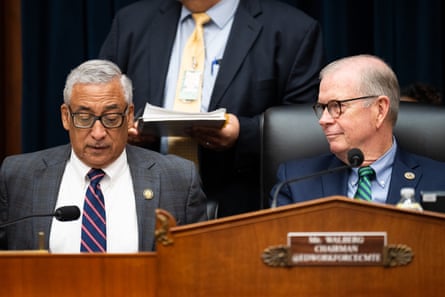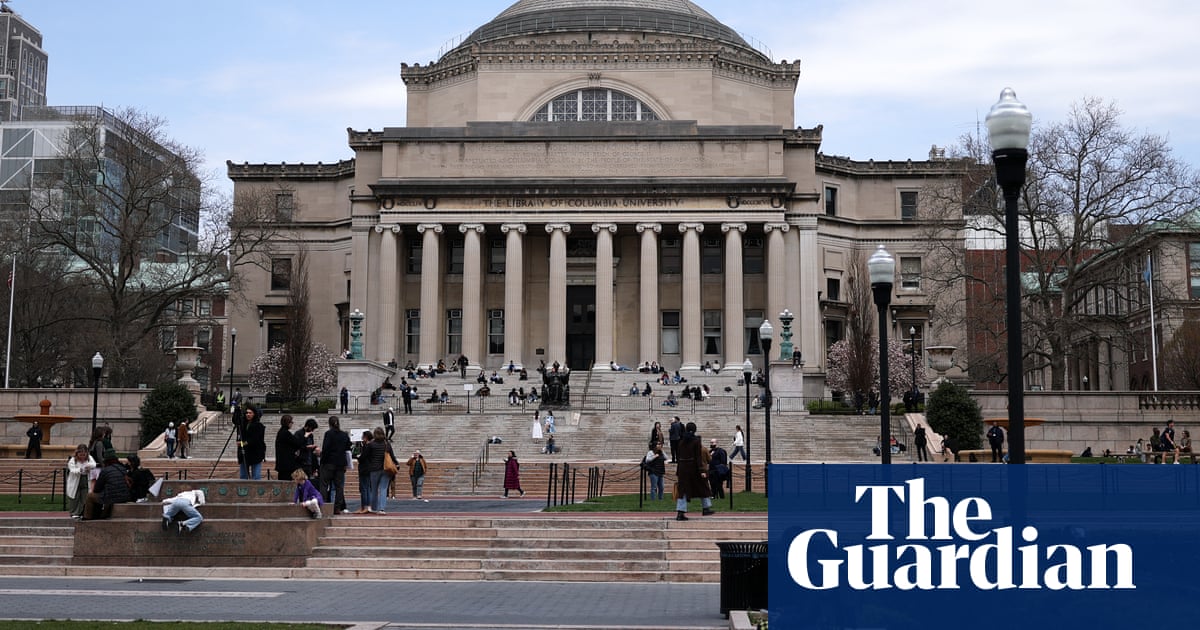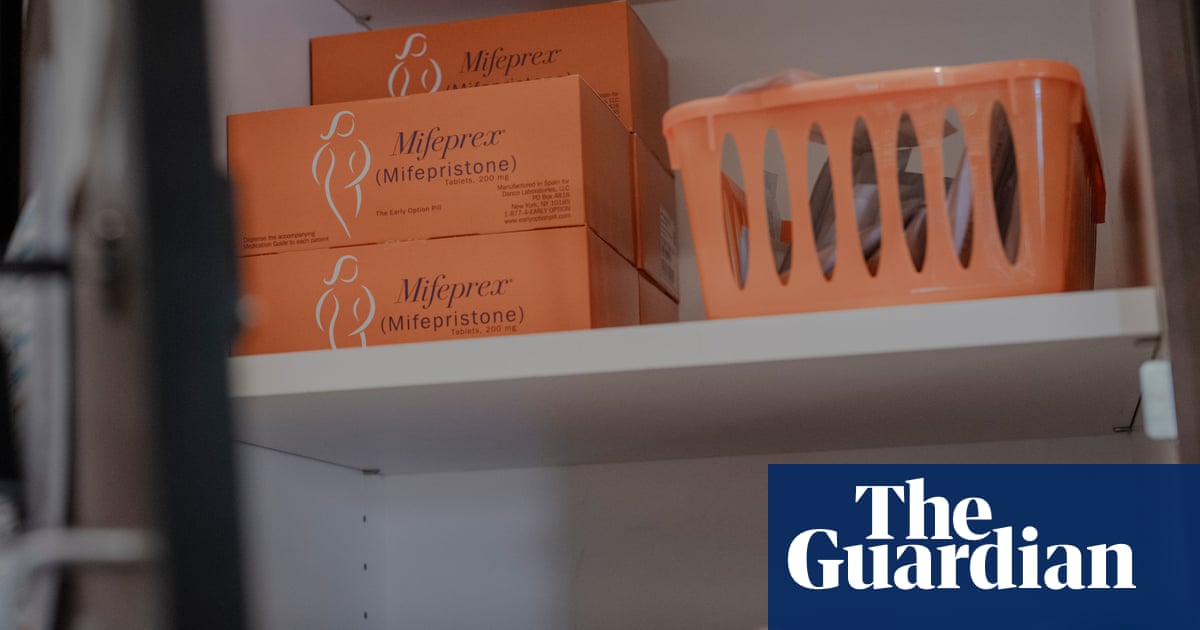A number of Republican legislators set to grill university presidents in a congressional hearing on antisemitism this week are associated with calls for Jews to convert to Christianity, have quoted Adolf Hitler, or have reportedly threatened to burn a synagogue to the ground.
A group of Haverford professors, most of them Jewish, has raised concerns about the legislators, pointing to statements they have made in the past and antisemitic incidents in their districts that the professors say they have not forcefully condemned.
On Wednesday, the US House committee on education and workforce will question the presidents of Haverford College, in Pennsylvania, DePaul University, in Chicago, and California Polytechnic State University, in San Luis Obispo, in a reprise of contentious showdowns between legislators and university administrators that last year played a part in the resignations of several university presidents.
In a memo shared exclusively with the Guardian, the faculty at Haverford have questioned the credibility of several members of the committee.
The faculty have requested anonymity to avoid retaliation. In the memo, they write that the committee’s chair, Republican representative Tim Walberg of Michigan, is associated with the Moody Bible Institute, which, according to the memo, “trains students to convert Jewish people to Christianity”. Representative Mark Harris of North Carolina, it notes, once said that until Jews and Muslims accept Jesus Christ “there’ll never be peace in their soul or peace in their city”.
The faculty also condemned committee member Mary Miller of Illinois, who in a speech outside the US Capitol the day before the January 6 attack, quoted Hitler and said he was “right on one thing” when he said that whoever “has the youth has the future”. (Miller later apologized.)

The memo notes that several members of the committee hail from districts with a history of neo-Nazi incidents. It points to Appalachian State University in North Carolina – in a district committee member Virginia Foxx has represented for two decades – where, in recent years, antisemitic groups have distributed promotional materials, scratched swastikas and racist slurs on to the car of a Jewish student, and spray-painted swastikas and covered campus spaces with antisemitic stickers. The university, the memo notes, is not among those facing congressional investigations, which are instead focused on pro-Palestinian speech.
The memo also criticises representative Mark Messmer of Indiana for making “no visible statements critical of Nazi and white supremacist antisemitism” in his district and state, and New York’s Elise Stefanik for backing a political candidate who praised Hitler as “the kind of leader we need today”. (The candidate, Carl Paladino, apologized but suggested that his comment was taken out of “context”.) And it calls out Representative Randy Fine of Florida, a Republican Jewish congressman who reportedly threatened to burn his own synagogue “to the ground” for hiring an LGBTQ+ staff member.
The Guardian has reached out to all of the committee members named in this story for comment.
It’s not the first time Jewish scholars have accused those leading the fight over antisemitism on campuses of being compromised on the issue. In March, Jewish Voice for Peace’s academic council published a report arguing that Project Esther – a rightwing blueprint for undermining pro-Palestine solidarity in the US – “repeats and fortifies antisemitic tropes” by promoting the antisemitic conspiracy theory that powerful Jews are controlling social justice movements.
At Haverford, Jewish students and faculty have signed separate statements accusing the committee of “weaponising our pain and anguish” and saying that their voices “have absolutely not been represented in the current public discussion of antisemitism”.
“We reject the premise of the hearings as being at all concerned with antisemitism,” said Lindsay Reckson, a literature professor and one of the authors of the faculty statement. “They are political theater aimed at intimidating college administrations into sacrificing their commitment to academic freedom, and an effort to silence and police pro-Palestinian voices on campus – including many Jewish voices.”
The memo comes as Jewish scholars and students have increasingly condemned the Trump administration’s actions in the name of fighting antisemitism.

In a letter to Haverford’s president, Wendy Raymond, ahead of her congressional testimony, the committee references “antisemitic incidents” on campus, including the disruption of an antisemitism workshop by the Anti-Defamation League last October, and a talk, the same month, which the committee says “whistleblowers” reported as promoting “a culture of antisemitic discrimination”.
What the letter doesn’t say is that the protest against the ADL was staged entirely by Jewish students and that the lecture was by Rebecca Alpert – a rabbi as well as a professor of religion.
“To them, Jewish students means Zionist Jewish students,” said Ellie Baron, a senior at Haverford.
Alpert, a self-described anti-Zionist, told the Guardian that she was “astonished” the committee described her talk – about the difference between Judaism and Zionism – as antisemitic. “In my mind, it’s antisemitic to call a scholarly presentation by a rabbi antisemitism,” she said.
The conflation of criticism of Israel with antisemitism championed in congressional investigations has also muddled discussion over real antisemitism, Jewish faculty warn.
“It’s not that antisemitism doesn’t exist. We know it does,” said Joshua Moses, an anthropology professor at Haverford, who said he experienced it personally but stressed that the suffering in Gaza and the arrests of foreign students for their pro-Palestinian advocacy are more pressing concerns at the moment.
“If there’s antisemitism, I want to hear about it, let’s figure out how to address it, but let’s also look at who’s most at risk and who’s most suffering at this point.”
He added: “I don’t feel unsafe. But if I did, this congressional committee is not the place I would go to.”

 German (DE)
German (DE)  English (US)
English (US)  Spanish (ES)
Spanish (ES)  French (FR)
French (FR)  Hindi (IN)
Hindi (IN)  Italian (IT)
Italian (IT)  Russian (RU)
Russian (RU)  5 hours ago
5 hours ago
























Comments